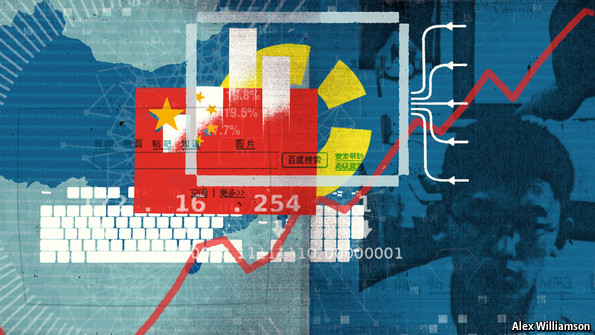China’s vast domestic censorship system is spreading abroad, helped in part by U.S. companies, in a way that is affecting the global information environment and posing major challenges to U.S. interests, according to a report written for a congressional commission.
“These challenges necessitate that the United States takes action to safeguard its domestic information space and to preserve a free and open internet, both of which are vital factors for continued U.S. economic prosperity and individual liberty,” said Censorship Practices of the People’s Republic of China, a detailed report by the Center for Intelligence Research and Analysis, a think tank belonging to Exovera, an intelligence and security company in Vienna, Virginia.
The report comes at a time of tension between the United States and China on multiple fronts, with U.S. security agencies seeing China as the nation’s biggest strategic rival. It was requested by the U.S.–China Economic and Security Review Commission, which monitors the relationship between the countries and provides recommendations to Congress for action.
Calling China’s information control system “the world’s most elaborate and pervasive censorship apparatus,” the authors said that as well as using censorship to maintain the Communist Party‘s monopoly on power at home with “public opinion guidance,” as the CCP calls it, the party also views the overseas information environment – the internet and media, companies, diplomacy and international politics – as vital to the party’s survival and carries out extensive “international public opinion guidance” in global information environments.
They used a broad definition of censorship that goes beyond simply preventing publication to include such practices as deliberately pumping out false online information to drown out or distort facts, or punishing companies for saying things that China believes violate its interests in an effort to ensure that they self-censor.
China’s embassy in Washington, D.C. told Newsweek “We firmly oppose these groundless accusations against China. The Chinese government protects press freedom in accordance with law, and gives full play to the role of media and citizens in supervising public opinion.” Spokesperson Liu Pengyu said: “We urge the U.S. to reflect on itself and stop framing China for the so-called ‘censorship syste
“US media including the New York Post have revealed cases about how the US Department of Defense and the FBI had meddled in social media platforms to disseminate disinformation and manipulate domestic and international public opinion,” Liu said, adding that last year China released a report that said the United States was manipulating media and social media companies to influence global opinion.
The commission’s charter mandates it to track restrictions on speech and access to information in China in relation to the United States security, “as well as any potential impact of media control by the People’s Republic of China on United States economic interests.”
Asked for comment, the commission referred Newsweek to its November 2023 annual report to Congress where it said Beijing’s overseas influence activities had become “flagrant.”
“Foreign countries’ media, politicians, businesses, academic institutions, and ethnically Chinese citizens and residents are all major targets of Beijing’s harmful, aggressive, and at times illegal overseas influence efforts,” with activities including “harassment of the press, including allegedly framing individual reporters for criminal activity,” the commission wrote in a section titled, “Battling for Overseas Hearts and Minds.”
Global Rise – Helped by America
China’s leader, Communist Party General Secretary Xi Jinping, says China will lead the world in the economy, science and technology, and have a military capable of “fighting and winning wars” by 2049 at the latest. Chinese leaders view the U.S. as the key obstacle to its global rise to preeminence.
Despite that, U.S. companies are helping the party grow its censorship system, the authors said, while noting that there was only limited evidence to suggest that any such help from U.S. firms was deliberate.
“The PRC is devoting considerable resources toward the development and fielding of advanced AI and big data analysis technologies for online content monitoring,” they said.Crucially, many of these AI-enabled “public opinion guidance” tools rely on off-the-shelf components imported from the United States, such as general processing units (GPUs) and cloud computing infrastructure,” the authors write, adding, “Chinese firms that produce censorship and surveillance technology have allegedly instrumentalized partnerships with companies such as Google and IBM to refine and improve their products.”
Newsweek has reached out to Google and IBM for comment. It has also reached out to the Chinese embassy in Washington, D.C.
While some U.S. firms are only indirectly implicated, “in many cases, foreign companies working in China deliberately conceal their connections to China’s security services, which complicates due diligence to avoid contributing to the PRC’s censorship apparatus,” the authors warned.
Censorship over Russia-Ukraine War
To illustrate the global challenge to the U.S., the authors singled out China’s censorship of the Russia-Ukraine War. “While maintaining an ostensibly neutral stance on the Russia-Ukraine War, China has actively facilitated the propagation of pro-Russian content,” the report says. “The extensive and adaptive censorship efforts—ranging from flooding the airwaves with Russian talking points and engaging in keyword suppression to the deletion of dissenting and aberrant views—illustrate an intricate web aimed at shaping domestic and international narratives to align with China’s geopolitical and ideological objectives, while subtly highlighting its sovereign prerogatives.”

